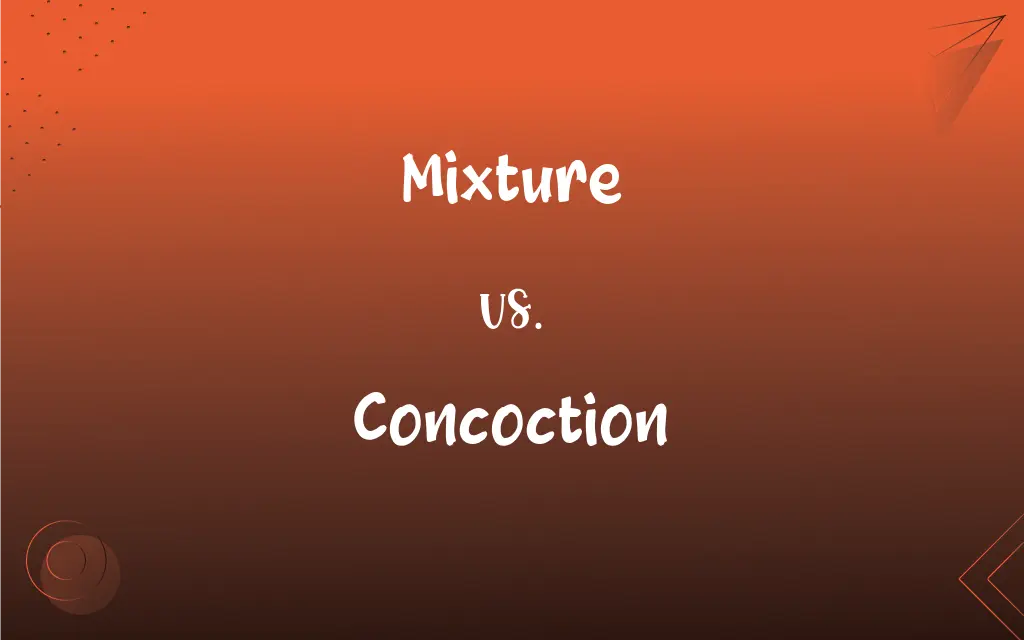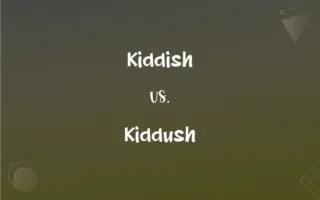Mixture vs. Concoction: What's the Difference?
Edited by Aimie Carlson || By Janet White || Updated on March 4, 2024
A mixture is a combination of two or more substances that retain their individual properties, while a concoction is a type of mixture created with a specific purpose in mind, often implying complexity or experimentation.

Key Differences
Mixture refers to the physical combination of two or more substances where each substance retains its own chemical properties. Concoction, on the other hand, is a specific type of mixture that often conveys a sense of creativity or experimentation in its preparation. It implies the act of mixing various ingredients, sometimes unusual or unexpected, to create something new, often with a particular purpose or effect in mind.
Mixtures can be homogeneous (uniform composition throughout, like saltwater) or heterogeneous (non-uniform composition, like sand in water). The components of a mixture can usually be separated by physical means, such as filtration, evaporation, or decantation. Concoctions are frequently associated with culinary arts, medicine, or chemistry, where the outcome is a result of careful selection and combination of ingredients.
While all concoctions are mixtures, not all mixtures are concoctions. The term "concoction" carries additional connotations of intentionality, complexity, and sometimes innovation, beyond the simple definition of a mixture.
Comparison Chart
Definition
A combination of two or more substances that retain their individual chemical properties.
A mixture created with a specific purpose, often implying creativity or experimentation.
Homogeneity
Can be homogeneous or heterogeneous.
Typically heterogeneous, but can be made to appear homogeneous.
ADVERTISEMENT
Components
Substances in a mixture keep their original properties.
Ingredients are chosen for their ability to create a specific effect or result.
Separation
Components can usually be separated by physical means.
Separation is not the primary concern; the focus is on the end product.
Context
Used in scientific, culinary, and everyday language.
Often used in culinary, medicinal, and experimental contexts.
Mixture and Concoction Definitions
Mixture
Used broadly in science and daily life.
Concrete is a durable mixture of cement, sand, and water.
Concoction
A creative or experimental mixture, like a potion.
The chef's new dessert concoction was a hit at the dinner party.
ADVERTISEMENT
Mixture
Retains the properties of its components.
Mixing sugar and water creates a sweet mixture where both substances retain their properties.
Concoction
Often implies a secretive or unique recipe.
The herbalist prepared a medicinal concoction for the ailment.
Mixture
Can be separated into its components.
Sand and iron filings form a mixture that can be separated with a magnet.
Concoction
Designed for a specific purpose or effect.
The scientist developed a concoction to neutralize the toxic spill.
Mixture
The act or process of mixing
An alloy made from the mixture of two metals.
Concoction
Sometimes used to describe a dubious or untested mixture.
He skeptically sipped the green concoction offered at the smoothie bar.
Mixture
The condition of being mixed
The inevitable mixture of different cultures in big cities.
Concoction
Can result from trial and error.
Her latest concoction in the kitchen turned out surprisingly delicious.
Mixture
A combination of ingredients used in cooking or baking.
Concoction
To prepare by mixing ingredients, as in cooking.
Mixture
One that consists of diverse elements
The day was a mixture of sun and clouds.
Concoction
To devise, using skill and intelligence; contrive
Concoct a plan.
Mixture
A fabric made of different kinds of thread or yarn.
Concoction
The preparing of a medicine, food or other substance out of many ingredients.
Mixture
(Chemistry) A composition of two or more substances that are not chemically combined with each other and are capable of being separated.
Concoction
A mixture prepared in such a way.
Mixture
The act of mixing.
The mixture of sulphuric acid and water produces heat.
Concoction
Something made up, an invention.
Mixture
Something produced by mixing.
An alloy is a mixture of two metals.
Concoction
(obsolete) Digestion (of food etc.).
Mixture
Something that consists of diverse elements.
The day was a mixture of sunshine and showers.
Concoction
The act of digesting in the mind; rumination.
Mixture
A medicinal compound, typically a suspension of a solid in a solution
A teaspoonful of the mixture to be taken three times daily after meals
Concoction
Abatement of a morbid process, such as fever, and return to a normal condition.
Mixture
(music) A compound organ stop.
Concoction
(obsolete) The act of perfecting or maturing.
Mixture
A cloth of variegated colouring.
Concoction
A change in food produced by the organs of nutrition; digestion.
Mixture
(India) A mix of different dry foods as a snack, especially chevda or Bombay mix.
Concoction
The act of concocting or preparing by combining different ingredients; also, the food or compound thus prepared.
Mixture
The act of mixing, or the state of being mixed; as, made by a mixture of ingredients.
Concoction
The act of digesting in the mind; planning or devising; rumination.
Mixture
That which results from mixing different ingredients together; a compound; as, to drink a mixture of molasses and water; - also, a medley.
There is also a mixture of good and evil wisely distributed by God, to serve the ends of his providence.
Concoction
Abatement of a morbid process, as a fever and return to a normal condition.
Mixture
An ingredient entering into a mixed mass; an additional ingredient.
Cicero doubts whether it were possible for a community to exist that had not a prevailing mixture of piety in its constitution.
Concoction
The act of perfecting or maturing.
Mixture
A kind of liquid medicine made up of many ingredients; esp., as opposed to solution, a liquid preparation in which the solid ingredients are not completely dissolved.
Concoction
Any foodstuff made by combining different ingredients;
He volunteered to taste her latest concoction
He drank a mixture of beer and lemonade
Mixture
A mass of two or more ingredients, the particles of which are separable, independent, and uncompounded with each other, no matter how thoroughly and finely commingled; - contrasted with a compound and solution; thus, gunpowder is a mechanical mixture of carbon, sulphur, and niter.
Concoction
An occurrence of an unusual mixture;
It suddenly spewed out a thick green concoction
Mixture
An organ stop, comprising from two to five ranges of pipes, used only in combination with the foundation and compound stops; - called also furniture stop. It consists of high harmonics, or overtones, of the ground tone.
Concoction
The invention of a scheme or story to suit some purpose;
His testimony was a concoction
She has no peer in the concoction of mystery stories
Mixture
(chemistry) a substance consisting of two or more substances mixed together (not in fixed proportions and not with chemical bonding)
Concoction
The act of creating something (a medicine or drink or soup etc.) by compounding or mixing a variety of components
Mixture
Any foodstuff made by combining different ingredients;
He volunteered to taste her latest concoction
He drank a mixture of beer and lemonade
Mixture
A collection containing a variety of sorts of things;
A great assortment of cars was on display
He had a variety of disorders
A veritable smorgasbord of religions
Mixture
An event that combines things in a mixture;
A gradual mixture of cultures
Mixture
The act of mixing together;
Paste made by a mix of flour and water
The mixing of sound channels in the recording studio
Mixture
A physical combination of substances, like salad.
A fruit salad is a healthy mixture of various fruits.
Mixture
Includes solutions, suspensions, and colloids.
Air is a mixture of nitrogen, oxygen, and other gases.
FAQs
Is a smoothie a mixture or a concoction?
A smoothie can be considered both a mixture and a concoction, as it is a blend of various ingredients (mixture) created for a specific taste or nutritional purpose (concoction).
Why are concoctions often associated with medicine?
Historically, medicines were prepared by mixing various ingredients in precise ways to achieve desired effects, making them closely associated with the term "concoction."
Can a concoction be a solution?
Yes, a concoction can be a solution if it is a homogeneous mixture created with specific intentions, such as a medicinal syrup.
How do you separate components in a mixture?
Components in a mixture can be separated through physical means like filtration, evaporation, or using a magnet, depending on the nature of the mixture.
Can mixtures change states of matter?
While the state of matter of a mixture can change (e.g., freezing a liquid mixture to a solid), the mixture itself remains a combination of substances that retain their properties.
Are all chemical reactions concoctions?
Not all chemical reactions are concoctions. Concoctions imply a mixture for a specific purpose, while chemical reactions involve the transformation of substances into new compounds.
How do cultures influence concoctions?
Cultural traditions and knowledge significantly influence the ingredients and methods used in concoctions, especially in culinary and medicinal contexts.
What makes a concoction successful?
A successful concoction effectively achieves its intended purpose or effect, whether that's flavor in cooking, healing in medicine, or a desired reaction in chemistry.
How does the concept of a mixture apply to everyday life?
The concept of a mixture applies to everyday life in various ways, from the air we breathe (a mixture of gases) to the foods we eat (mixtures of different ingredients).
Is coffee considered a mixture or a concoction?
Coffee can be considered both a mixture (water and coffee grounds) and a concoction, especially when specific ingredients are added to achieve a particular flavor or effect.
What is the significance of temperature in preparing concoctions?
Temperature can play a critical role in preparing concoctions, affecting the solubility of ingredients, the rate of chemical reactions, and the overall taste or efficacy of the concoction.
How important is the ratio of components in a concoction?
The ratio of components in a concoction is often crucial, as it can significantly affect the outcome, efficacy, or flavor of the final product.
How do you determine the right proportions for a concoction?
Determining the right proportions for a concoction often involves research, understanding of the ingredients' properties, trial and error, and sometimes adherence to traditional or established recipes.
What role does experimentation play in creating concoctions?
Experimentation is key to concocting, as it involves trying different combinations and proportions of ingredients to achieve a novel or improved result.
Can a mixture become a concoction over time?
Yes, a mixture can become a concoction if it is modified or used with a specific purpose in mind, transforming it from a simple combination of ingredients to a purposefully created blend.
What ethical considerations are involved in concocting medicines?
Ethical considerations in concocting medicines include ensuring safety, efficacy, informed consent, and access to treatment, as well as avoiding harm and respecting patient autonomy.
What challenges do scientists face when creating concoctions for new treatments?
Scientists face challenges such as ensuring safety and effectiveness, regulatory approval, ethical considerations, and sometimes the unpredictability of how different ingredients interact.
Can concoctions be harmful if not prepared correctly?
Yes, concoctions can be harmful if ingredients are not properly chosen or mixed, especially in medicinal or chemical contexts where incorrect dosages or combinations can lead to adverse effects.
How do sensory properties affect the perception of a concoction?
Sensory properties like taste, smell, and texture significantly affect the perception of a concoction, influencing its acceptability and enjoyment, especially in culinary applications.
How has the understanding of mixtures and concoctions evolved over time?
The understanding of mixtures and concoctions has evolved with advances in chemistry, medicine, and technology, leading to more precise knowledge of how substances interact and how to harness these interactions for various purposes, from cooking to curing diseases.
About Author
Written by
Janet WhiteJanet White has been an esteemed writer and blogger for Difference Wiki. Holding a Master's degree in Science and Medical Journalism from the prestigious Boston University, she has consistently demonstrated her expertise and passion for her field. When she's not immersed in her work, Janet relishes her time exercising, delving into a good book, and cherishing moments with friends and family.
Edited by
Aimie CarlsonAimie Carlson, holding a master's degree in English literature, is a fervent English language enthusiast. She lends her writing talents to Difference Wiki, a prominent website that specializes in comparisons, offering readers insightful analyses that both captivate and inform.































































